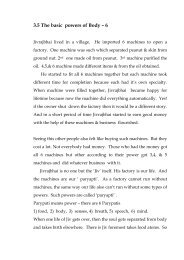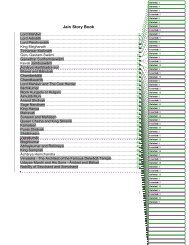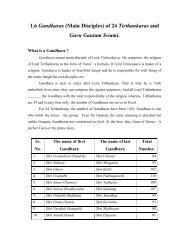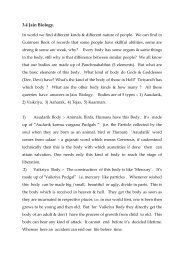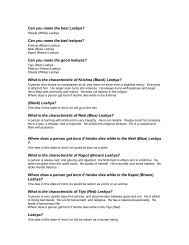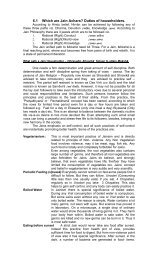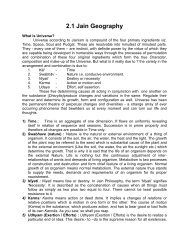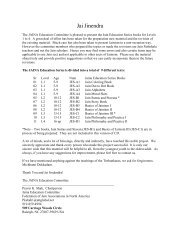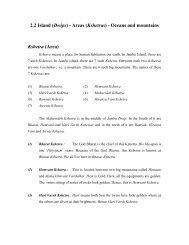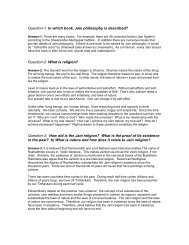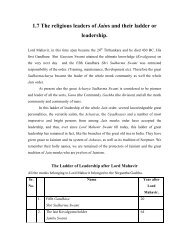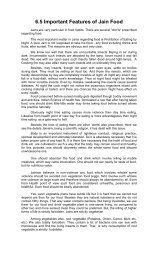2.8 Form of Liberation - Jainism, Jain Religion - colleges
2.8 Form of Liberation - Jainism, Jain Religion - colleges
2.8 Form of Liberation - Jainism, Jain Religion - colleges
- No tags were found...
Create successful ePaper yourself
Turn your PDF publications into a flip-book with our unique Google optimized e-Paper software.
<strong>2.8</strong> <strong>Form</strong> <strong>of</strong> <strong>Liberation</strong><br />
In <strong><strong>Jain</strong>ism</strong> there has been a thought about nine elements, and in that Moksha<br />
(liberation) is also one <strong>of</strong> the elements. That is the goal for a soul as well as the best way<br />
<strong>of</strong> life.<br />
The soul is always in the cycle <strong>of</strong> birth and re-birth, and its birth in any life<br />
depends on his Karmas. <strong>Liberation</strong> can be achieved by washing out all the Karmas on the<br />
soul for which great efforts are required by motivating the soul to bring out its original<br />
form with the help <strong>of</strong> right knowledge, Right vision and Right conduct.<br />
The soul has a body. Along with body there have been several attachment like<br />
passion life, three Vedas, Kashaya, Ignorance, Virtues, Sins, Colour, Taste, Touch, Rebirth<br />
etc. when all these wither away along with the body itself being separating from the<br />
body will be liberation.<br />
Once the Karmas are destroyed and soul becomes pure, never the Karmas apply<br />
to soul again. Once the liberation is achieved, it is permanent. Then the cycle <strong>of</strong> birth and<br />
re-birth ends. There is only the pleasure all around. The liberated soul’s life is unending<br />
knowledge, unending vision, unending strength and unending happiness.<br />
We make a mistake in recognising body as soul, but like a sword from its cover,<br />
both are separate. Of course, soul cannot be known and understood by senses or by<br />
breathing and re-breathing. Soul is all powerful, without powerful soul, the body will be<br />
like a non living thing. Thus, soul is extra ordinary. It is master <strong>of</strong> body. If we perform<br />
good or bad deed, we have to face the consequences. Good or bad (Dev Gati or Narak<br />
Gati). Like wise, if we bring the total retirement to Karmas, if we donot allow it to spoil<br />
our soul, we do get the result <strong>of</strong> such retirement tool. The retirement <strong>of</strong> Karmas is<br />
nothing else, but MOKSHA.<br />
The soul has an affection to Karmas’ good or bad activity, which is called Karma<br />
Sanyog. If therefore one becomes a lo<strong>of</strong> to Karma, if the affection, whatsoever, is<br />
withdrawn, the Karma (Result <strong>of</strong> Karma) are destructed and the purest form <strong>of</strong> soul the<br />
Moksha Swabhav appears.<br />
Moksha / liberation is the best position <strong>of</strong> soul. It is complete liberation from all<br />
acts and deeds <strong>of</strong> Karma. For the best <strong>of</strong> people it is a final destination.
The kinds <strong>of</strong> Karmas are many. They have been divided into 8 categories by <strong>Jain</strong><br />
Philosophy. The foremost among it is Mohniya Karma. The Darshan Mohniya Karma.<br />
The Darshan Mohniya Karma does not allow to know and understand the ‘soul’ in its<br />
real pure form. The Charitra Mohniya Karma comes in way <strong>of</strong> attaining Virragatwa. It<br />
does not allow one to become free form Rag. But the ancient learned author <strong>of</strong> scripture,<br />
Umaswatij in the script called ‘Tatwarthdhigam’ has very clearly mentioned that, ‘The<br />
true path to Moksha is Right Vision, Right Knowledge and Right conduct. If one can<br />
enlighten these 3 basic characteristics in one self, the attainment <strong>of</strong> Moksha is guaranteed.<br />
Siddha Loka (The Liberated soul)<br />
Who is Siddha? Siddha is one who is completely liberated from the Karma. All<br />
eight categories <strong>of</strong> Karmas which are destructing in nature should be totally destroyed;<br />
and when eight great virtues are presented, one becomes Siddha. Then they do not have<br />
the birth and re birth. For unending period <strong>of</strong> time, they will have the same Sidda<br />
position, they are harmless, they can not have diseases or grief, they will be static, their<br />
position is indestructible, they will not have body, they will be in top position among<br />
others.<br />
Eight Vice <strong>of</strong> Acts <strong>of</strong> Karmas<br />
Eight Virtues <strong>of</strong> Karmas nature.<br />
Gyanavarniya Karma – Destructing Anantgyana – True knowledge<br />
Knowledge<br />
Darshanavarniya Karma - Destructing Anantdarshan – True Vision<br />
Vision<br />
Mohniya Karma – Destructing Love and Anant charitra – True Vitragita<br />
Hate.<br />
Antray Karma – Destructing attainment Anant Labdhi – Special Quality <strong>of</strong><br />
achievement.<br />
Vedniya Karma – Related to pains Anant Avyabadh sukh – Unending<br />
happiness for ever.<br />
Nam Karma – Affecting Fame<br />
Arupipanu – No form<br />
Gotra Karma – Affecting Family name Aguru-lagu – A static quality.
Ayushya Karma – Affecting life’s<br />
longitivity<br />
Akshaya Sthiti – A permanent position<br />
Siddha means liberated for those, who are totally, free totally liberated complete in all<br />
respect could there be further categories? However, for our purpose, for explaining the<br />
significance <strong>of</strong> Siddhatva to the persons who want to know and understand, we have<br />
worked out a list wherein the eligibility to attain Siddhatva is explained e.g. The Avgahna<br />
<strong>of</strong> the Siddha is somewhat less than the highest body. The Siddhatva is available to one<br />
<strong>of</strong> the following 15 categories. Siddhatva can be obtained by destructing 8 kinds <strong>of</strong><br />
Karmas.<br />
Eligibility for Siddhatva<br />
10 ways : Must be a Truskaya, Must be free from food,<br />
Must have all 5 senses, Must have Kshayik Bhav,<br />
Must have Sangitva, Must have Ultimate Knowledge,<br />
Must be a human, Must have Ultimate Vision,<br />
Must be great / good. Must have a Famous Character.<br />
15 Categories:<br />
1. Jin Siddha: Becomes Siddha after becoming Tirthankaras<br />
(Lord).<br />
2. Ajin Siddha: Do not become Lord Tirthankara but only becomes<br />
Siddha e.g. Gautam Swami, Pundrik Swami.<br />
3. Tirth Siddha: Becomes Siddha after establishing Tirth e.g.<br />
Gandharas etc.<br />
4. Atirth Siddha: Becomes Siddha before establishment <strong>of</strong> Tirth e.g.<br />
Meru Deva Mata.<br />
5. Grihasthalinge Siddha: Becomes Siddha even while a householder e.g.<br />
King Bharat.<br />
6. Anyalinge Siddha : Becomes Siddha even from other order <strong>of</strong> religion<br />
e.g. Vallcalchiri.
7. Swalinge Siddha : Becomes Siddha even as Monk e.g. <strong>Jain</strong> Monk.<br />
8. Streelinge Siddha : Becomes Siddha even though a Woman e.g.<br />
Chandan Bala etc.<br />
9. Purushlinge Siddha : Becomes Siddha even as male e.g. Gaj Sukumal<br />
10. Napunsaklinge Siddha: Becomes Siddha even as third sex e.g. Gangey.<br />
11. Pratyek Buddha Siddha: Because <strong>of</strong> earlier Sanskara, without any course,<br />
becomes avairagya muni and then becomes Siddha<br />
e.g. Karkandu King.<br />
12. Swayam Buddha Siddha: When the Karmas are diminished, goes to Moksha<br />
e.g. Kapil Kevali.<br />
13. Buddha Bodhit Siddha : Goes to Moksha after becoming monk by Guru’s<br />
sermon e.g. Mahavir.<br />
14. Ek Siddha : Goes to Moksha only in isolation e.g. Lord<br />
Mahavir.<br />
15. Anek Siddha: Goes to Moksha in company or many persons e.g.<br />
Lord Adinath.<br />
All these are conditions prior to attainment <strong>of</strong> Moksha. But, eligibility for Moksha<br />
and its true instruments are only Shukla Dhyan – a kind <strong>of</strong> flow <strong>of</strong> good and virtuous<br />
thoughts only or pure conduct or totally keeping away from love and hatred. The kind <strong>of</strong><br />
feelings are generated by True and Right knowledge only, and then only Moksha can be<br />
ensured. Here are thing is important. No matter one is a monk, or Tapars <strong>of</strong> other<br />
religious order, or even a housholder, but if one can generate in oneself the feeling <strong>of</strong><br />
Vitragatva totally free from both love and hatred, then one is eligible to attain<br />
Moksha. The Ling Manhood or womanhood are only external matter. Bhav(the feelings)<br />
is an internal matter. Even if one gets ultimate final knowledge called Kevalgyana, but if<br />
the life is incomplete, one has to lead that life as a monk, and then only one can be<br />
eligible to be Siddha.<br />
Here, even some householders have also attained Siddhatva. But it should be<br />
considered as an exception Remember that Sukla Dhyana i.e. good and virtuous thoughts<br />
only are ways to Moksha, and without it, no Moksha is possible. And again, monkhood is<br />
an uniform for Mokshatva.




